The way that can be told is not the eternal way.
The word that can be spoken is not the eternal Word.
Unnamed, It is the source of heaven and earth.
Named, It is the mother of all things.
He who is ever without desires sees Its spirtual essence
He who is ever under desires sees only Its limits.
These two, differing in name, are the same in origen
They are the mystery of mysteries.
This is the door of spiritual life.
2
When all men have learned the beauty of righteousness,
the ugliness of sin is understood.
When all men recognize goodness, then evil is understood.
In the same way, the manifest and the unmanifest define each other.
Difficult and easy define each other.
Long and short reveal each other.
Height and depth manifest each other.
Former and latter define each other.
Therefore the Master works without working.
He teaches in silence.
3
The seclusion of the Masters keeps the world from strife.
A low esteem of wealth keeps the world from covetousness.
When objects of desire are hidden, men’s hearts are undisturbed.
Therefore, where the Master rules, he empties the heart of desires.
He fills the inner nature. He strengthens its bones.
He constantley stells the mind and abates desires.
Those who have knowledge, he restrains from bondage to action.
He himself stands free from bondage to action;
therefore all whom he rules abide in quietude.
4
The Way seems empty.
As it is tried, it is found inexhaustible.
Oh how profound it is?
It seems to be the Forefather of all beings.
It quiets impetuosity. It loses bonds.
It tempers its splendour. It follows lowliness.
Oh, how pure it is!
It seems to have been before the Lord of Heaven.
5
Heaven and earth are without partiality.
They regard al creatures as the dog (of straw in the sacrifice)
The Master is without partiality.
He regards mankind as the dog of straw.
The Being that is between heaven and earth
is like the bellows of the forge, empty, yet processing power.
Put in motion, it sends forth more and more.
He who would tell the Way, soon becomes silent.
It is better to follow the way of work with detachment.
6
The spirit of the valley dies not.
It is called the mysterious Mother.
The door of the mysterious Mother is called the source of heaven and earth.
It is eternal and seem to manifest itself
He who enters into it, finds rest.
7
Heaven and earth endure.
If they endure, it is because they live not for themselves.
It is beacuse of this that they endure.
So the Master puts himself after others, yet remais the first.
He is detached from his body, yet conserves his body.
Is it not because he has no desires for himself,
that all his desires are fulfilled.
8
The spirit of goodness is like water.
Water excels in doing good to all, yet strives not.
It seeks the lowly places rejected by others.
Therfore he who is like this, drws near to the Way.
His chosen dwelling place is in humility.
His heart loves the depth of the abyss.
His gifts are given by impartial love.
He speaks words of faithfulness.
His government brings peace.
He is skilful in all he undertakes.
He acts in all things with timeluness.
He strives gainst none; therfore he is not opposed.
9
It is better not to fill the vessel than to try to carry it when it is quite full.
The blade that is over-shapened loses his edge,
even though it be tested with the hand.
The hall that is filled with gold and jade cannot be guarded.
He who has honours heaped upon him,
and thereby grows proud,
draws down misfortune upon himself.
He who has done great things and gained renown should withdraw himself.
Such is the Way of heaven.
10
The spirtual shoud rule the psychic nature.
When he is one-pointed, these act in consonance.
When he masters the bodily powers,
rendering therm obedient, he is as one new born.
Whern he frees himself from the illusion of the mind,
he puts away all infirmities.
If he would guard the people and bring peace in the kingdom,
let him work with detachment.
When he accepts the opening and closing of the gates of heaven,
he rests like a brooding birth.
Though bringing them forth, he is without the desire of posession.
He cherishes them, yet looks for no reward.
He rules them, yet without dominating them.
This is called perfect righteousness.
Source: Tao Teh King (Daodejing) by Lao Zi, translated by Charles Johnston
